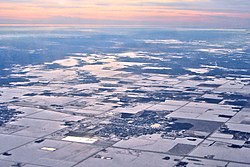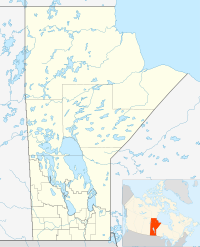Beausejour, Manitoba
Beausejour | |
|---|---|
| Town of Beausejour | |
 Aerial view with Beausejour in the centre foreground | |
 Town boundaries | |
| Coordinates: 50°03′44″N 96°30′58″W / 50.06222°N 96.51611°W | |
| Country | Canada |
| Province | Manitoba |
| Region | Eastman |
| Rural Municipality | Brokenhead |
| Established | 1874 |
| Incorporated | 1908 (village) 1912 (town) |
| Government | |
| • Mayor | Ray Schrile |
| • Governing Body | Town Council |
| • MP (Selkirk-Interlake-Eastman) | James Bezan (CPC) |
| • MLA (Lac du Bonnet) | Wayne Ewasko (PC) |
| Area | |
• Total | 5.35 km2 (2.07 sq mi) |
| Elevation | 251.2 m (824 ft) |
| Population (2021) | |
• Total | 3,307 |
| • Density | 584.4/km2 (1,514/sq mi) |
| Time zone | UTC-6 (CST) |
| • Summer (DST) | UTC-5 (CDT) |
| Area code(s) | Area codes 204 and 431 |
| Website | www |
Beausejour (/ˌboʊzəˈʒʊər/)[1] is a town in the Canadian province of Manitoba. It is 46 kilometres northeast of Winnipeg, just west of the Canadian Shield and Whiteshell Provincial Park. The French name Beauséjour [beau + séjour] means "beautiful stay". The town is surrounded by the Rural Municipality of Brokenhead.
Etymology
[edit]The current community name comes from the French phrase meaning "a good place" or "a good stopping place".[2][3] There are a few variations as to the origin and establishment of the name, although all share similarities in being named by a railway employee.[3] One version is that a French Canadian National Railway engineer, after slashing through brush and swamp, came to this high and grassy place.[3]
A second documented version from S. Turner, the town's postmaster in 1905 says that he believed the town name came from a French Canadian government engineer. The railway station was built on a small, elevated area of sand and gravel, which had been called "Stony Prairie" by local Indigenous peoples. The engineer provided the name as it was a good camping ground from the other low lying areas.[3]
A third and final version says that the town`s first residents, Mr. and Mrs. H.W.D. Armstrong were the ones to name the town. Mr. H.W.D. Armstrong was a Canadian Pacific Railway surveyor who was responsible for the selection of names along this line and asked his wife to name it. She suggested the Beausejour name for "a nice play to stay".[3]
History
[edit]In 1906, the "Manitoba Glass Works" was founded, in a town now known as Beausejour, by Joseph Keilback and his partners. Sustained by a nearby deposit of high quality sand, it was the first glass container factory in Western Canada. Glassblowers from Poland and the United States, supported by local labour, used silica sands to produce bottles for breweries and soft drink companies in Winnipeg. In 1909 it was taken over by a Winnipeg businessman, who expanded production to include jars, medicine bottles, and ink bottles. At its peak, the Manitoba Glass Works employed 350 workers, but because of its inability to compete with Eastern Canadian manufacturers, was purchased in 1913 by a Montreal company and relocated to Redcliff, Alberta. The factory site remains, and was designated as a Provincial Heritage Site (number 41) on 27 September 1989.[4]
In 1912, the Town of Beausejour was incorporated.[5]
It is the birthplace of former Provincial Premier and Governor General Edward Schreyer.[6] Edward Schreyer School is named after him in his honour.
Beausejour was the setting for the 1990 film The Outside Chance of Maximilian Glick, & its 1990-91 television dramedy series adaptation, Max Glick. The film was largely filmed there.
Demographics
[edit]In the 2021 Census of Population conducted by Statistics Canada, Beausejour had a population of 3,307 living in 1,483 of its 1,572 total private dwellings, a change of 2.7% from its 2016 population of 3,219. With a land area of 5.42 km2 (2.09 sq mi), it had a population density of 610.1/km2 (1,580.3/sq mi) in 2021.[10]
Access
[edit]Major highways servicing Beausejour are PTH 44 and PTH 12, which run concurrently north of town. From the south, Beausejour can be reached by traveling PTH 12 and Provincial Road 215 east into town or by taking PR 302. PTH 44, PR 215, and PR 302 intersect at the west side of town.
Prior to the construction of the Trans-Canada Highway, PTH 44 was the main route from Winnipeg to the Ontario border.
Economy
[edit]Beausejour's current economy is based on agriculture (grain production) and tourism.[5] Its location as a main access point to the Whiteshell Provincial Park, a popular cottage region and tourist attraction, allows Beausejour to cater to visitor traffic through the area. It also serves as the main commercial centre for farmers and residents of the surrounding areas.
Notable people
[edit]- Raquel Dancho, politician
- Bob Davie, former NHL defenceman
- Monika Deol, TV host
- Peter Engbrecht, WWII pilot
- Jason Gunnlaugson, curler
- Fred Klym, politician
- Mark Koenker, politician
- Hayley Marie Kohle, model
- Edward Schreyer, former Premier of Manitoba and Governor general of Canada
- John Mouat Turner, politician
- Anton Weselak, politician
Recreation
[edit]The town is home to the Canadian Power Toboggan Championships, the Double B Agricultural Festival (formerly Double B Rodeo and Country Fair) and the annual Brokenhead River Agricultural Conference. Beausejour is also known for its annual "Shades of the Past" car show on the last Sunday of August. The car show encompasses all of Park Avenue and attracts over 500 classic and special interest vehicles.
Beausejour has also hosted the 2011 Manitoba provincial men's curling championship (then known as the Safeway Championship) won by Jeff Stoughton (Charleswood), and two Manitoba provincial women's curling championships, Scotties Tournament of Hearts, at the Sun Gro Centre. The 2004 Manitoba Scott Tournament of Hearts was won by Lois Fowler (Brandon, Wheat City Curling Club), while the 2016 Scotties Tournament of Hearts was won by Kerri Einarson (East St. Paul Curling Club), with Beausejour's Selena Kaatz playing third.
Sports
[edit]Beausejour hosted the 2006 Power Smart Manitoba Games. The opening ceremonies were held at the CPTC Racetrack, and the closing ceremonies at the Sun Gro Centre.
Beausejour's hockey teams are known as the Blades. Beausejour's CRJHL team is the Beausejour Comets. The Eastman Selects of the Manitoba Midget 'AAA' Hockey League plays in the town. Hockey games are played in the Sun Gro Centre, which also has a curling rink.[11]
Media
[edit]The Beausejour Review published its final issue on 27 June 2013.[12]
There are two local weekly community newspapers serving the Beausejour and Brokenhead area.
The Clipper Weekly and The Lac du Bonnet Clipper. The Clipper Publishing Corp.
Town Radio Beausejour broadcasts to Beausejour and the surrounding area as CKBJ-FM at 93.9 on the FM dial.
Climate
[edit]Beausejour has a humid continental climate influenced by its far inland position in the higher mid-latitudes, resulting in warm and occasionally hot summers and frequently severely cold winters, with January average highs being below −11 °C (12 °F).
| Climate data for Beausejour (1981–2010 normals) | |||||||||||||
|---|---|---|---|---|---|---|---|---|---|---|---|---|---|
| Month | Jan | Feb | Mar | Apr | May | Jun | Jul | Aug | Sep | Oct | Nov | Dec | Year |
| Record high °C (°F) | 7.0 (44.6) |
10.5 (50.9) |
18.5 (65.3) |
34.0 (93.2) |
37.0 (98.6) |
38.0 (100.4) |
36.7 (98.1) |
39.0 (102.2) |
38.0 (100.4) |
29.4 (84.9) |
22.2 (72.0) |
8.5 (47.3) |
39.0 (102.2) |
| Mean daily maximum °C (°F) | −11.3 (11.7) |
−7.0 (19.4) |
−0.3 (31.5) |
10.5 (50.9) |
18.4 (65.1) |
23.1 (73.6) |
25.6 (78.1) |
25.2 (77.4) |
18.5 (65.3) |
10.2 (50.4) |
−0.4 (31.3) |
−9.1 (15.6) |
8.6 (47.5) |
| Daily mean °C (°F) | −16.9 (1.6) |
−12.8 (9.0) |
−5.7 (21.7) |
4.2 (39.6) |
11.4 (52.5) |
16.7 (62.1) |
19.3 (66.7) |
18.5 (65.3) |
12.5 (54.5) |
5.0 (41.0) |
−4.8 (23.4) |
−14.1 (6.6) |
2.8 (37.0) |
| Mean daily minimum °C (°F) | −22.4 (−8.3) |
−18.5 (−1.3) |
−11.2 (11.8) |
−2.2 (28.0) |
4.3 (39.7) |
10.2 (50.4) |
12.9 (55.2) |
11.6 (52.9) |
6.4 (43.5) |
−0.3 (31.5) |
−9.1 (15.6) |
−19.1 (−2.4) |
−3.1 (26.4) |
| Record low °C (°F) | −44.5 (−48.1) |
−46.7 (−52.1) |
−42.2 (−44.0) |
−30.6 (−23.1) |
−13.9 (7.0) |
−4.4 (24.1) |
0.0 (32.0) |
−2.5 (27.5) |
−8.3 (17.1) |
−23.0 (−9.4) |
−39.5 (−39.1) |
−42.5 (−44.5) |
−46.7 (−52.1) |
| Average precipitation mm (inches) | 24.6 (0.97) |
15.5 (0.61) |
23.4 (0.92) |
29.7 (1.17) |
58.1 (2.29) |
87.5 (3.44) |
87.1 (3.43) |
76.3 (3.00) |
65.1 (2.56) |
46.0 (1.81) |
29.7 (1.17) |
27.2 (1.07) |
570.3 (22.45) |
| Average snowfall cm (inches) | 24.3 (9.6) |
13.1 (5.2) |
14.2 (5.6) |
9.0 (3.5) |
3.1 (1.2) |
0.0 (0.0) |
0.0 (0.0) |
0.0 (0.0) |
0.0 (0.0) |
7.5 (3.0) |
21.2 (8.3) |
25.5 (10.0) |
117.8 (46.4) |
| Source: Environment Canada[13] | |||||||||||||
References
[edit]- ^ James McCarten (2017), The Canadian Press Stylebook (18th ed.), Toronto: The Canadian Press, ISBN 9780920009543
- ^ "Manitoba Communities: Beausejour (Town)". Manitoba Historical Society. Retrieved 1 February 2024.
- ^ a b c d e Geographical Names of Manitoba (PDF). Government of Manitoba. 2002. p. 67. Retrieved 1 February 2024.
- ^ "Historic Resources - Provincial Heritage Sites". www.gov.mb.ca.
- ^ a b "Town of Beausejour - Home". www.townofbeausejour.ca.
- ^ "ED Schreyer". University of Manitoba. Archived from the original on 8 October 2012. Retrieved 22 July 2010.
- ^ Censuses 1871-1931
- ^ "Canada Year Book 1955" (PDF). Archived from the original (PDF) on 9 December 2013. Retrieved 2014-08-30., Census 1941-1951
- ^ "Canada Year Book 1967" (PDF). Archived from the original (PDF) on 23 December 2014. Retrieved 2014-08-30., Census 1961
- ^ a b "Population and dwelling counts: Canada, provinces and territories, and census subdivisions (municipalities), Manitoba". Statistics Canada. 9 February 2022. Retrieved 20 February 2022.
- ^ Sun Gro Centre
- ^ Paul, Alexandra (26 June 2013). "Lac du Bonnet, Beausejour papers to cease publication". Winnipeg Free Press. Retrieved 4 July 2013.
- ^ "Canadian Climate Normals 1981-2010". Environment Canada. 25 September 2013. Retrieved 10 June 2018.


